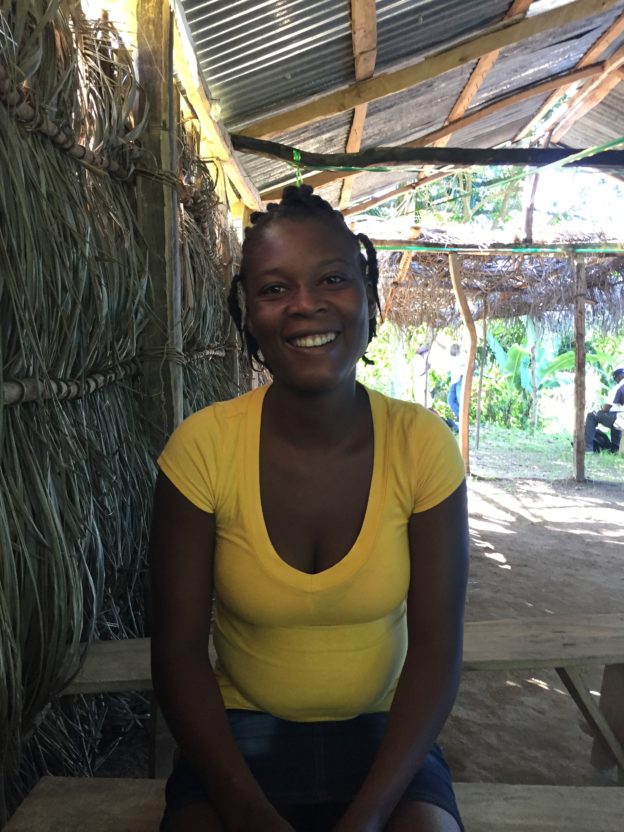Monise says that she’s begun to make progress.
She hasn’t been able to put the finishing touches on her house. It still needs a door and a galatan. The latter is a ceiling that covers the portion of a house’s roof that extends beyond its front room to cover the porch. Without one, the house is never really closed because someone could always climb in between the top of the wall and the roof. Monise couldn’t finish the work because she didn’t have the lumber. In fact, she had already borrowed lumber from two other members just to get as far as she has gotten, so she needed enough to both pay back the other members and finish repair of her own home.
She went to St. Juste, a member of the CLM Village Assistance Committee in her area, Fon Desanm, and a leader of the community, and she asked him what she should do. This was a new experience for Monise. “I never thought there was anyone in the community I could go to.” St. Juste was able to find her a tree that someone was willing to sell. She’d have to pay to have it cut down and then made into boards, but she found the money she needed to do so, and was excited to finally have the completion of her home within sight.
A last-minute change in plans made things easier. Talking with St. Juste and her case manager, Martinière, made it clear that she could buy enough planks already prepared. She wouldn’t have to cut down the tree after all, nor find skilled workers she would to prepare the lumber.
Her goats are healthy. Both of her older ones are pregnant. They should have their second litters of kids in December. Her female kid will be also ready to start reproducing soon. She hopes to sell the male in December so she can buy a small pig. Rearing pigs has become the centerpiece of her economic activities. Her first hog will be ready for sale to a butcher in December, and she plans to use the money to buy a cow. She’s already purchased a piglet from her mother even before the piglet is born. Between it and the one she’ll buy by selling her goat, she expects to have a boar to fatten and a sow to raise for the piglets it should provide.
On one hand, it’s nice to see her wealth grow, especially because it seems to follow a clear plan to continue her progress. On the other, it is a little concerning to see her depend so fully on livestock alone. She has no daily income. All of hers comes in lumps.
But she herself is not concerned. She explains that she and her mother are on really good terms. “Sometimes I have something and she doesn’t, and then I cook for both of us. Sometimes it’s the other way around. But we get by together.” Martinière paints a less rosy picture, though. “I’ve been speaking to the mother, because she’s too inclined to do everything for Monise. Monise has to learn to do things herself.” That’s something for her and Martinière to work on.
But that is just where Monise thinks she’s made the most progress. “I’ve learned to struggle on my own,” she explains. When she first joined the program, she depended on the fathers of her four children for almost everything. That’s where her hopes rested. She was waiting at the time for the youngest child’s father to return from the Dominican Republic with money for her and his child.
She’s learned, however, that she cannot depend on him or on any of the others. She has a new boyfriend, a cousin’s friend, and he’s the one who gave her the money for the wood to complete her home, but she’s taking a cautious attitude. She doesn’t think she should depend on him too much. She’s started to buy chickens as a way to cover the small expenses she occasionally needs to incur. So even here, she has a plan of her own.
